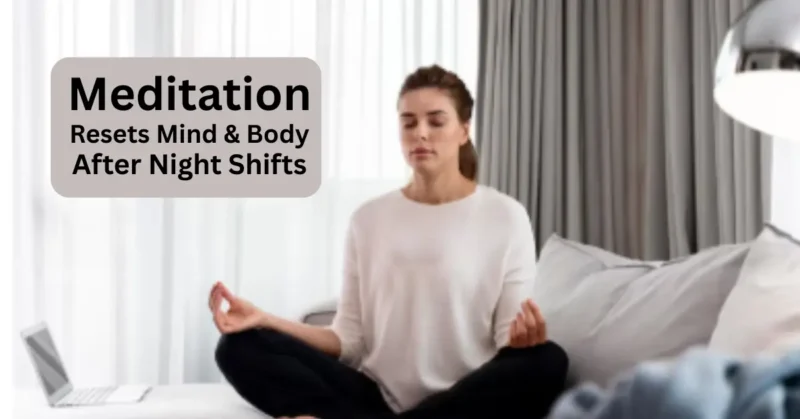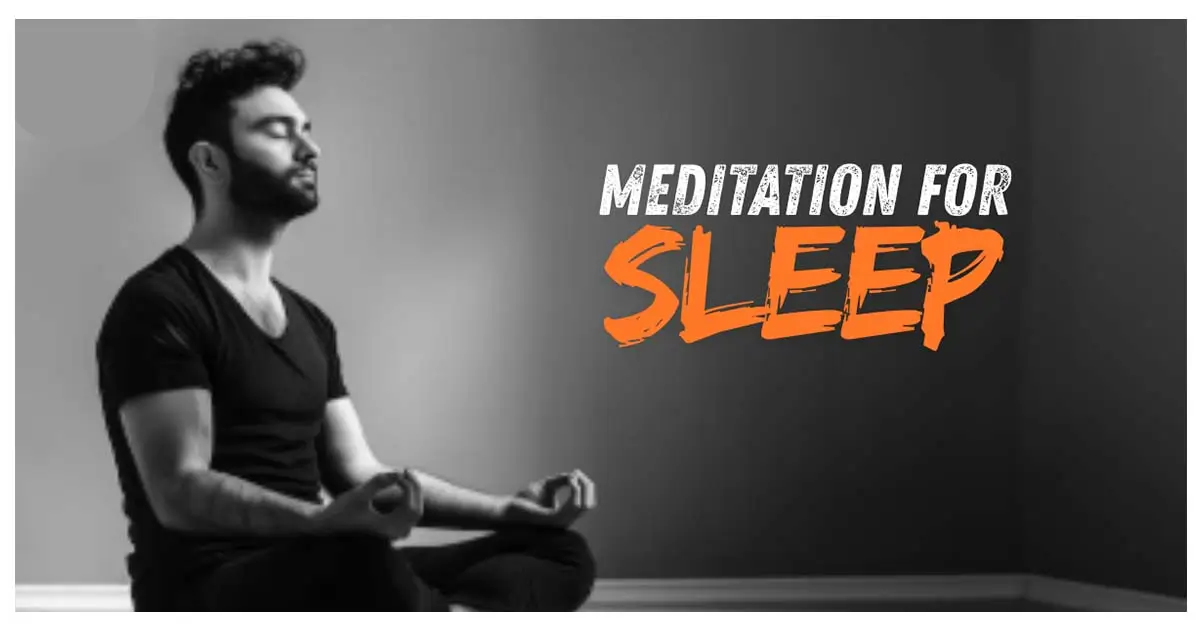Struggling to sleep after your 3rd shift? Discover how meditation for sleep can calm your mind, reset your rhythm, and help you wake up truly refreshed—inside, you’ll find proven tips and gentle routines.
Thank you for reading this post, don't forget to subscribe!If you’ve ever come home after a long night shift feeling wired but exhausted, you’re not alone. As someone who’s worked the third shift, I know how hard it is to quiet your mind when the rest of the world is just waking up.
That’s where meditation for sleep made all the difference for me. It’s not just about silence or sitting still—it’s about creating the right inner environment for rest. In this guide, you’ll discover how meditation works for night shift workers like us, what techniques help, and how to build a routine that supports deep, natural sleep.
How Meditation for Sleep Can Help 3rd Shift Workers Rest Better Naturally
Working the night shift disrupts more than just your schedule—it completely disrupts your sleep pattern. I know because I lived it. The tossing and turning after a long shift, the tired eyes that won’t close, and the stress of knowing sleep just isn’t happening.
Eventually, I found something gentle that helped: meditation. And if you’re struggling to rest after working nights, this post might be the reset button your body needs.

Let me walk you through exactly how meditation can improve your sleep as a night shift worker, along with real-life stories, techniques, and tools that have helped me and others sleep more soundly.
Understanding Sleep Challenges Faced by Shift Workers
When your job demands you to be awake during the night and sleep during the day, your circadian rhythm goes out of sync. That internal body clock wants light when you want dark and rest when you need to focus.
You might feel weird when it’s finally bedtime. Or exhausted, yet unable to relax. You may rely on sleep aids or feel like you’ve just adapted to poor sleep, but until your body starts showing signs—such as fatigue, fog, and mood swings—you may not realize the extent of the problem.
You’re not alone. Shift workers across industries face this.
How Meditation for Sleep Gently Resets the Mind and Body After Night Shifts
Meditation isn’t just about closing your eyes and breathing—it’s about telling your body and brain it’s safe to rest.

After a night shift, your nervous system is still in “go mode.” Meditation acts like a bridge between your alert state and your rest state. It helps the body shift into a more relaxed state, calms the mind, and lowers the pulse rate.
I discovered how to invite sleep rather than try to force it. Everything changed at that point.
The Science Behind Sleep and Meditation
What Happens to the Body During Meditation
Your body enters a deep state of relaxation while meditating. Your breathing becomes slower. Your muscles become softer. Slower alpha and theta waves (calm and dreamy) replace high-frequency beta waves (alert) in the brain.
Meditation is an ideal pre-sleep activity, as it mimics the natural process of transitioning to sleep.
Meditation’s Impact on Melatonin and Cortisol
Night shift workers often struggle with low melatonin and high cortisol at the wrong times. But meditation can help rebalance both.
Studies indicate that mindfulness exercises, particularly when performed in a calm, dark environment, can naturally increase melatonin production and decrease cortisol levels.
I started using earphones and meditating for ten to fifteen minutes in a blackout room. I gradually began to fall asleep more quickly and stay asleep for more extended periods.
The Neuroscience of Mindfulness and Relaxation
When you practice meditation regularly, it strengthens the parasympathetic nervous system—your body’s “rest and digest” mode. It also reduces activity in the amygdala, the part of your brain that triggers stress.
This isn’t just mental; it’s physical. Meditation reshapes your brain to make relaxation easier.
What Meditation Can Do for Night Shift Sleep Struggles

Reducing Sleep Latency and Improving Sleep Quality
Many shift workers take 1–2 hours to fall asleep. I was one of them. With consistent meditation, that delay shrinks. You fall asleep more quickly, and the quality of your sleep improves.
Your body can’t just “decide” to sleep—it needs help. Meditation offers that nudge.
Enhancing Emotional Balance and Lowering Stress
Night shifts can make you feel disconnected and irritable. Meditation helps bring you back to center. It reduces emotional reactivity and promotes calm before sleep and during waking hours.
I started feeling less “edgy” on days off and more emotionally stable, even when tired.
Supporting Long-Term Sleep Rhythm Restoration
Meditation won’t replace a perfect sleep schedule, but it can retrain your system to recognize when it’s time to wind down. Over weeks, your body starts anticipating rest after your practice.
That’s when your rhythm starts to shift—slowly but surely.
Top Sleep Meditation Techniques That Work
Body Scan Meditation for Physical Relaxation
Beginning at your toes, mentally move up your body, taking note of any tense spots. You don’t need to fix anything—just become aware. It helps release muscle tightness and signals safety to your nervous system.
Breathwork to Calm the Nervous System
Even a simple 4-7-8 breath—inhale for 4 seconds, hold for 7 seconds, exhale for 8 seconds—can help shift your body into a calm state. I used this one after stressful ER shifts, and it helped me feel grounded.
Guided Imagery for Deep Sleep Induction
Listening to a calming voice guide you through a peaceful setting—such as walking through a forest or floating in water—can help soothe racing thoughts. Apps and YouTube channels offer endless free options.
Loving-Kindness and Affirmation Practices
Gentle affirmations, such as “I’m safe to rest” or “My body deserves deep sleep,” can be repeated to counteract the nervous thoughts that frequently prevent people from falling asleep.
Best Apps and Tools to Support Sleep Meditation
Recommended Meditation Apps
- Insight Timer—Free meditations, including sleep-specific ones
- Calm—Soothing bedtime stories and meditations
- Headspace—Regular mindfulness classes and sleep meditations
Try a couple to discover which suits you the best; each has a distinct feel.
Audio Tracks, Timers, and Bedtime Music
Look for delta wave sleep music or nature sounds that help your brain slow down. I keep a small Bluetooth speaker near my bed and a preset playlist ready.
How to Create a Personalized Sleep Ritual
After my shift, I would take a shower, drink some chamomile tea, turn down the lights, and then lie in bed while listening to a 10-minute meditation recording. It works for me. Eventually, that pattern turned into a rest trigger.
Real Stories: How Meditation for Sleep Helped Night Workers Sleep Again
I’m not the only one.
A nurse I know started 5-minute meditations after years of sleep issues. Now, she sleeps 6–7 hours post-shift—something she thought was impossible.
A truck driver friend listens to breath-focused meditations during breaks. He says it stops the crash-and-burn cycle and helps him rest when off duty.
Real stories like these demonstrate how meditation can be effective, even when everything else hasn’t.
Expert Tips for Building a Meditation for Sleep Routine
Ideal Time and Setting for Meditation for Sleep After a Shift
Try meditating right after your wind-down routine, not while you’re still stressed and buzzing from work. Use blackout curtains, white noise, and aromatherapy to create a peaceful sleep cave.
Avoiding Common Mistakes When Starting Out
Don’t expect instant magic. If you’re new to meditation, your mind will wander. That’s okay. Start small—five minutes is enough. Don’t judge the outcome. Keep showing up.
Combining Meditation for Sleep with Herbal Tea, Aromatherapy, or Journaling
A simple lavender tea, a few drops of essential oil, or a quick journaling session before meditation can enhance the calming effect. I often jot down three things I’m grateful for to help shift my energy.

Permit Yourself to Rest
Night shift life is hard. But you deserve to have a good night’s sleep and wake up feeling rejuvenated.
Meditation isn’t a cure-all, but it’s a gentle and powerful practice that can help you reset your sleep, reduce stress, and cultivate a sense of peace. It helped me rediscover rest—and it can do the same for you.
If you’re ready, try a 5-minute meditation today. No pressure. Just permission.
Read more Health and Wellness Tips for a healthier you!
You might love to read:

